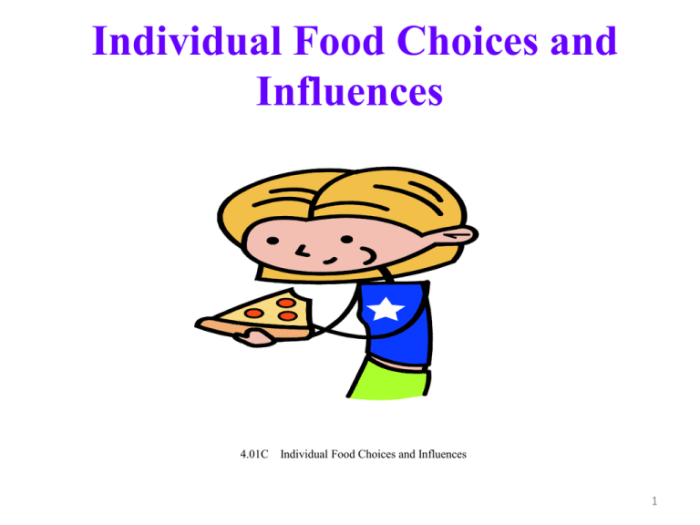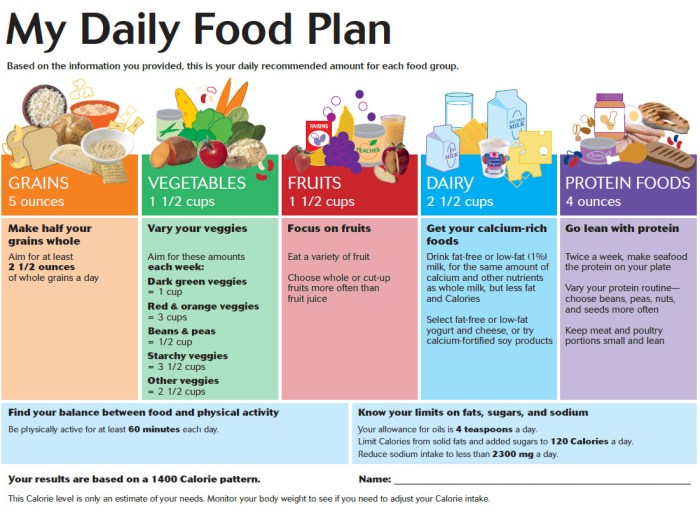Physiological influences on food choices include gender age wellness and – Physiological influences, including gender, age, and wellness, play a significant role in shaping our food choices. These factors interact with biological, sociocultural, and environmental cues to determine our dietary preferences and habits. Understanding these influences is crucial for promoting healthy eating behaviors and addressing nutritional challenges across different populations.
Gender-specific preferences and aversions, age-related nutritional needs and challenges, and the impact of overall health and well-being on food choices are key aspects to consider in developing tailored dietary recommendations and interventions.
Gender and Food Choices

Gender plays a significant role in shaping food preferences and dietary patterns. Biological factors, such as hormones and genetics, may influence taste perception and food cravings. Socio-cultural norms, expectations, and socialization practices also contribute to gender differences in food choices.
Examples of Gender-Specific Food Preferences
- Women tend to prefer fruits, vegetables, and low-fat dairy products.
- Men are more likely to consume red meat, processed foods, and sugary drinks.
Factors Contributing to Gender Differences
- Biological factors:Hormones can affect taste perception and food cravings, especially during pregnancy and menopause.
- Socio-cultural factors:Gender roles and expectations can influence food choices, with women often being associated with healthy eating and men with indulgent eating.
Age and Food Choices

Age is another key factor that influences food preferences and dietary habits. Nutritional needs, physiological changes, lifestyle factors, and social factors all play a role in shaping age-related food choices.
Nutritional Needs and Challenges
- Infancy and childhood:Rapid growth and development require a nutrient-rich diet, including protein, calcium, and iron.
- Adolescence:Increased calorie needs and hormonal changes can lead to cravings for high-fat, sugary foods.
- Adulthood:Maintaining a healthy weight and managing chronic diseases become important nutritional concerns.
- Older adults:Reduced appetite, impaired taste perception, and difficulty chewing can affect food choices.
Physiological Changes
- Metabolism:Metabolic rate decreases with age, requiring fewer calories.
- Digestion:Stomach acid production and enzyme activity decline, affecting food absorption.
- Sensory perception:Taste and smell senses may diminish, altering food preferences.
Wellness and Food Choices: Physiological Influences On Food Choices Include Gender Age Wellness And

Overall health and well-being are closely linked to food choices. Dietary factors can influence physical, mental, and emotional health.
Physical Health, Physiological influences on food choices include gender age wellness and
- Chronic diseases:A healthy diet can reduce the risk of chronic diseases such as heart disease, stroke, and type 2 diabetes.
- Weight management:Consuming nutrient-rich foods helps maintain a healthy weight.
- Bone health:Calcium and vitamin D intake are essential for maintaining bone strength.
Mental and Emotional Health
- Mood:Certain foods, such as fruits and vegetables, have been linked to improved mood and reduced symptoms of depression.
- Cognitive function:A diet rich in antioxidants and omega-3 fatty acids may protect against cognitive decline.
- Sleep quality:Consuming tryptophan-rich foods before bedtime can promote sleep.
Question & Answer Hub
How does gender influence food choices?
Gender can influence food preferences and aversions due to biological factors, such as hormonal differences, and sociocultural factors, such as gender roles and societal expectations.
How does age affect food choices?
Age affects food choices as nutritional needs and challenges change throughout the lifespan. For example, children have higher energy requirements, while older adults may have reduced appetites and altered taste preferences.
How is wellness related to food choices?
Wellness encompasses overall health and well-being, including physical, mental, and emotional aspects. Dietary factors can significantly impact wellness by providing essential nutrients, reducing the risk of chronic diseases, and improving mood and cognitive function.
